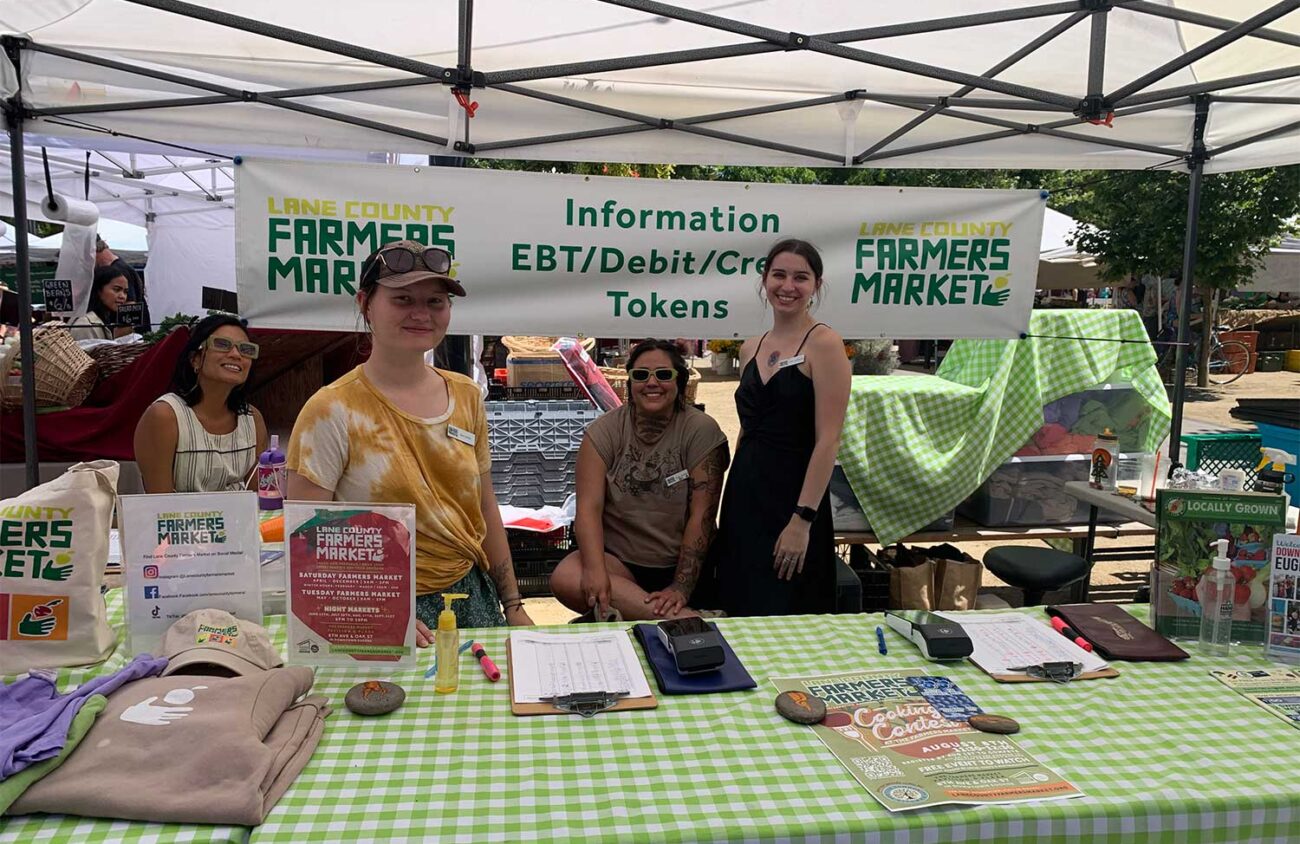By Rachael Ward
If you’re in downtown Eugene on a Saturday morning, you’re likely to see crowds of people flocking, tote bags in hand, eager to grab the freshest foods at the local farmers market. There’s no doubt, the southern Willamette Valley boasts some of the widest diversity of locally grown and produced goods in the country.
From artichokes to tomatoes, table grapes to watermelons, the summer is a time to celebrate the bounty of our fertile soils. But while the positive impact on your weekend morning may be the first to come to mind, local markets are also responsible for supporting the social fabric of our community.
Every year, farmers markets across the country come together to celebrate all that they do during the USDA proclaimed National Farmers Market Week. This year, celebrations are August 6 to 12, coordinated by the Farmers Market Coalition. So what better time to acknowledge all that farmers markets do to create loving communities?
If you’ve shopped at a farmers market, you’re likely aware of the benefits. Things like access to the freshest food; supporting small scale businesses; boosting local economies; and helping to combat climate change. But the big, intangible thing that farmers markets do is create relationships between the people that grow our food and those that eat it. And these relationships are vital to creating a resilient community.
Farmers markets are community gathering spaces. This role became evident as the world shut down during the height of COVID-19. Throughout the pandemic, farmers markets in Oregon adapted with drive through models, online pre-ordering, and special shopping hours for vulnerable populations. These efforts maintained a vital support system as the world was socially isolated.
A robust local food system proved to be essential during COVID. As we saw global supply chains fail, farmers markets stepped in to provide a vital source of nourishment to their communities. Programs like Double Up Food Bucks match the value of SNAP benefits (formerly food stamps), dollar for dollar, up to $20 for the purchase of locally grown produce. Food access programs like these support communities experiencing poverty without sacrificing farmers’ bottom line. Today, as food prices rise due to inflation, and increases in SNAP benefits end, these programs help to maintain connections between shoppers and growers.
The relationships that farmers markets are founded on help to build resilience in communities impacted by climate change and wildfire disasters. During the catastrophic 2020 wildfires we saw farmers step up to donate fresh food to evacuees and open pasture land for evacuated livestock. Communities in turn showed up for farmers, forming volunteer “Crop Mobs” to help with harvesting or cleaning up damage. The generous spirit of connected communities has really shown us the power of networks.
But farmers markets haven’t always been the most welcoming to everyone. A long history of racism and discrimination has created a perception of farmers markets as predominantly white spaces. In 2021 the Farmers Market Coalition supported the creation of an Anti-Racist Farmers Market Toolkit, aimed at creating more equitable farmers markets. This toolkit, created by 10 Black food systems experts from across the country, focuses on how farmers markets can integrate an anti-racist framework within their “Mission, Management, Messaging, and Measurement.”
Local groups like the Oregon Farmers Markets Association (OFMA) have used the guidance of this toolkit to create training and peer learning opportunities for markets that are interested in creating more equitable spaces of belonging. As a result, the culture and perception of farmers markets is beginning to shift, and it’s a change that benefits everyone. Markets grounded in their community’s needs are more relevant and effective
Farmers markets are vital to creating community; to building localized systems that are resilient in the face of climate change, pandemics, inflation and volatile economic systems. So when you’re shopping at your local market this week (Eugene has several!), think about the ways that you can show up for your fellow shoppers, farmers and farmers market organizers beyond just buying your weekly groceries. Try volunteering, adding an extra tip at checkout, donating to the market, or writing a sincere thank you card to market organizers. Let’s celebrate farmers markets every week!
